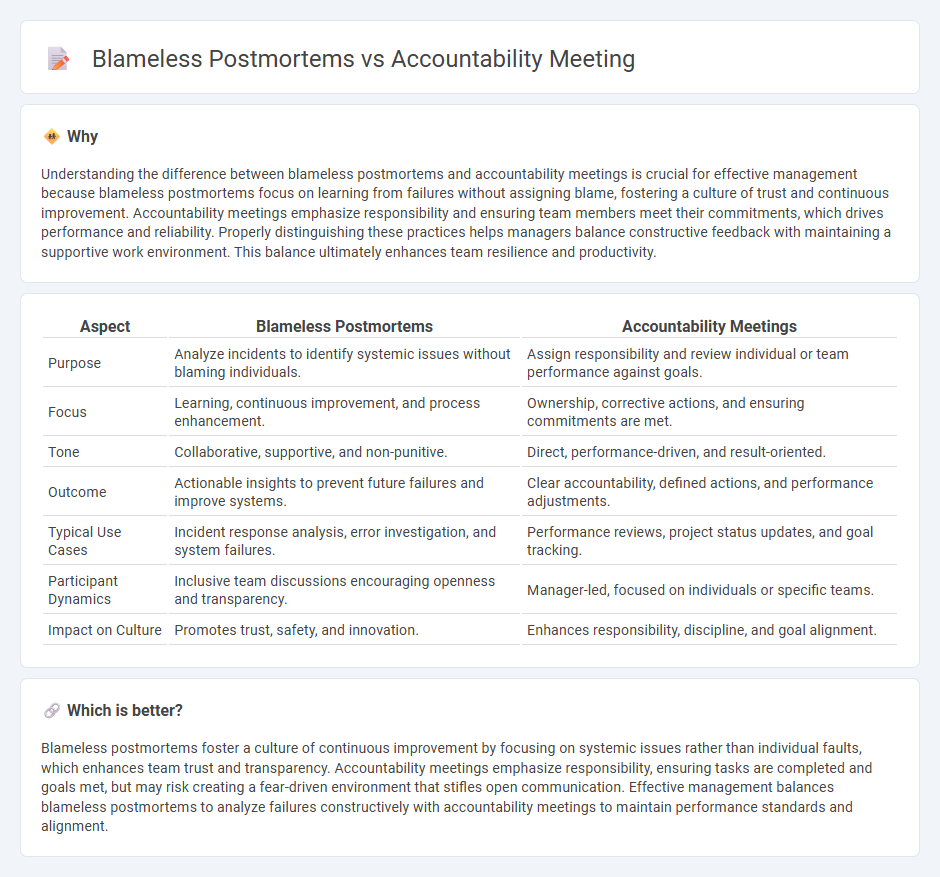
Blameless postmortems focus on identifying systemic issues and improving processes without attributing fault to individuals, fostering a culture of continuous learning and psychological safety. Accountability meetings, by contrast, emphasize assigning responsibility and ensuring follow-through on actions, which can sometimes lead to defensiveness and hinder open communication. Discover how adopting blameless postmortems can enhance team performance and collaboration by learning more about their principles and best practices.
Why it is important
Understanding the difference between blameless postmortems and accountability meetings is crucial for effective management because blameless postmortems focus on learning from failures without assigning blame, fostering a culture of trust and continuous improvement. Accountability meetings emphasize responsibility and ensuring team members meet their commitments, which drives performance and reliability. Properly distinguishing these practices helps managers balance constructive feedback with maintaining a supportive work environment. This balance ultimately enhances team resilience and productivity.
Comparison Table
| Aspect | Blameless Postmortems | Accountability Meetings |
|---|---|---|
| Purpose | Analyze incidents to identify systemic issues without blaming individuals. | Assign responsibility and review individual or team performance against goals. |
| Focus | Learning, continuous improvement, and process enhancement. | Ownership, corrective actions, and ensuring commitments are met. |
| Tone | Collaborative, supportive, and non-punitive. | Direct, performance-driven, and result-oriented. |
| Outcome | Actionable insights to prevent future failures and improve systems. | Clear accountability, defined actions, and performance adjustments. |
| Typical Use Cases | Incident response analysis, error investigation, and system failures. | Performance reviews, project status updates, and goal tracking. |
| Participant Dynamics | Inclusive team discussions encouraging openness and transparency. | Manager-led, focused on individuals or specific teams. |
| Impact on Culture | Promotes trust, safety, and innovation. | Enhances responsibility, discipline, and goal alignment. |
Which is better?
Blameless postmortems foster a culture of continuous improvement by focusing on systemic issues rather than individual faults, which enhances team trust and transparency. Accountability meetings emphasize responsibility, ensuring tasks are completed and goals met, but may risk creating a fear-driven environment that stifles open communication. Effective management balances blameless postmortems to analyze failures constructively with accountability meetings to maintain performance standards and alignment.
Connection
Blameless postmortems focus on identifying system failures without assigning personal blame, fostering a culture of transparency and continuous improvement. Accountability meetings build on this foundation by addressing actionable insights and responsibilities derived from postmortem findings to drive organizational learning. Together, they create a feedback loop that enhances team performance and operational resilience.
Key Terms
**Accountability meeting:**
Accountability meetings emphasize clear ownership of tasks and responsibilities, fostering transparency and proactive problem-solving within teams. These meetings track progress, identify bottlenecks, and ensure stakeholders are aligned on corrective actions to prevent repeat issues. Explore how implementing accountability meetings can strengthen team dynamics and operational efficiency.
Responsibility
Accountability meetings emphasize assigning responsibility and evaluating individual performance to ensure tasks are completed and standards are met. Blameless postmortems focus on identifying systemic issues and learning from failures without attributing fault to individuals, fostering a culture of continuous improvement. Explore how shifting from accountability meetings to blameless postmortems can enhance team collaboration and operational resilience.
Performance review
Accountability meetings concentrate on evaluating individual performance through direct feedback and responsibility assignment, aiming to improve accountability within teams and projects. Blameless postmortems prioritize analyzing systemic issues and root causes of failures without attributing fault to individuals, fostering a culture of continuous learning and collaborative problem-solving. Explore how integrating both approaches can enhance your organization's performance review process.
Source and External Links
Planning for an Accountability Session - An accountability meeting is a session between citizens and public officials designed to hold decision makers accountable by asking questions, exchanging ideas, and securing commitments from officials.
How to Hold an Accountability Session | WORC - An accountability session facilitates dialogue between citizens and public officials to raise issues, obtain clear answers about officials' actions, and encourage accountability in a respectful, well-planned meeting environment.
Accountability Resolution Meeting & Hearing Procedure | Towson - In a student accountability context, an accountability meeting allows students alleged of policy violations to present their perspective, review evidence, and understand disciplinary options before potential escalation to a formal hearing.
 dowidth.com
dowidth.com